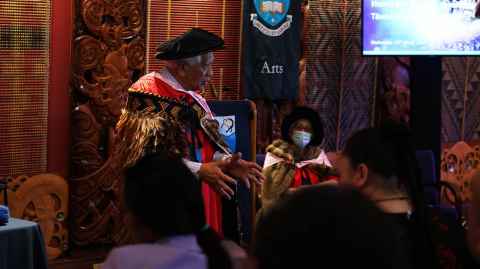University of Auckland Honors Pioneers of Māori Education
In a ceremony held at Waipapa Marae, the University of Auckland bestowed a significant honour on the esteemed Māori education pioneers, Tāwhirimātea (Tāwhiri) and Kaa Williams. Both were conferred with honorary doctorates of literature.
Held on 20 March, the event, which featured heartfelt waiata tautoko and haka, was a tribute to the pair’s unwavering dedication and contributions to the advancement of Māori education and culture. It was attended by members of Council, the Williams’ whānau and Māori leaders and representatives from the University.
The couple are inspirational figures for academia and the wider community, being renowned te reo Māori and tikanga Māori champions. They have ensured Māori culture is involved in all tiers of education, arts, business, research, governance, policy, and the legal world.
They have been recognised as the only Māori husband-and-wife team to be awarded the Companion of the New Zealand Order of Merit in the 2023 New Year’s Honours list, and at that point, Kaa already had a QSO, and Tāwhiri a MNZ.
With up to 60 years of collective service to Māori education, the couple led the first bilingual kura in Ruatoki in 1977 before co-founding Auckland-based Te Wānanga Takiura o Ngā Kura Kaupapa Māori o Aotearoa in 1990. The rumaki reo, or full immersion programme, has led to an increase in the number of qualified te reo Māori teachers, contributing to preserving Māori heritage.
Tāwhiri maintains the role of chief executive at Takiura, while Kaa is a pouako matua (senior lecturer).
A moving speech by the University’s Pro Vice-Chancellor Māori, Associate Professor Te Kawehau Hoskins, highlighted the Williams’ “inestimable contributions” to te ao Māori and Māori education.
She described them as, “our esteemed couple, the dream team”.
“Whaea Kaa and Pāpā Tāwhiri demonstrate outstanding leadership for transformative outcomes in te ao Māori and our nation.”
Hoskins also notes their strong relationship with Waipapa Taumata Rau, University of Auckland.
“They committed to a lifetime of teaching, but they are also lifelong learners themselves. In 2000, they completed a Master of Education with first-class honours here at the University of Auckland. Kaa then taught te reo Māori in Māori Studies until 2016.”
In 2013, the pair established the Judge Karina Williams scholarship for the University’s Law School, in memory of their late daughter. The scholarship recognises cultural involvement, leadership and academic merit.
Judge Karina was also a graduate of the University, and the second ever wahine Māori to be appointed to the District Court.
“Through the development and nurturing of aspiring Māori lawyers, this scholarship is transformational for Indigenous jurisprudence, and for the future of our nation,” Hoskins said.

Upon receiving their honorary doctorates of literature, the pair reflected on their education and te reo journey, not only emphasising the importance of the language, but that they also had to start somewhere too.
In a time where te reo Māori was not encouraged and English language was thought to be the bread and butter to sustain a household, it was at University where Tāwhiri made a pivotal change – and where he met Kaa.
When a school principal’s job was advertised for the first Māori medium school in the country, Tāwhiri jumped at the chance to apply. Although he couldn’t speak fluent te reo, he took the position as an opportunity to learn.
He served as principal for 19 years at the Ruatoki-based school, with the help of mentors and local kaumātua John Rangihau, Te Uru McGarvey, Rangipuke Tari and Te Kaari Waaka.
Kaa reminisced on the difficulties of learning English and how it was engrained at school, but her parents encouraged the continuation of speaking te reo Māori at home.
She shared a heartfelt kōrero of once living in a cave in Murupara when she was six years old, which she described to be an adventure.
Her whānau lived off the land, caught and hunted their food or planted it, and the language thrived.
The pair have worn many professional hats throughout their six-decade careers, earning themselves many awards and lifetime achievements.
Now they can add Dr to their names.

